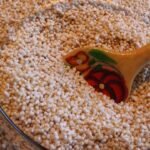In the past few years, certified organic flour has become widely available at supermarkets, natural foods stores and online. You may be wondering what distinguishes it from regular flour and if it is worth the high price. To decide if organic flour is for you, consider the following:
- What it is: Certified organic flour is milled from pesticide-free grain grown in soil only fertilized by natural substances. The harvested grain is stored without fumigants or irradiation. If you worry that pesticides and other synthetic agents may enter the wheat plants and be retained in flour, presenting a health risk over the course of years’ ingestion, then you will want to seek out organic flour.
- What it tastes like: Some bakers swear that organic flour produces better-tasting baked goods. Others can’t tell the difference. You’ll have to experiment before deciding where you stand on this. As far as flavor and texture go, most bakers agree on the importance of buying unbleached and unbromated flour (organic flour is never bleached or bromated; other flours sometimes are and sometimes aren’t). Bleach and bromate are used to speed the aging of flour and to leave flour with a bitter aftertaste. Flour aged naturally when it is exposed to oxygen over time highlights the flavors of the grain.
- Organic flour and the environment: Many people buy organic flour to support organic farming and its gentle impact on our environment. Fertilizer and pesticide run-off can pollute groundwater, threatening native wildlife. Concentrations of toxic residues (think of the pesticide DDT) build until the diet of animals at the top of the food chain is poisonous, threatening entire species. Organic farming leaves a smaller carbon footprint, and its spread may slow climate change.
So is it worth the price? The difference in cost between regular and organic flour is significant. A 5-pound bag of King Arthur Unbleached All-Purpose Flour retails for about $4.95 while King Arthur Organic All-Purpose Flour costs $8.95, but when you think about how many cookies you can bake from a single bag (between 75 and 100 per pound), organic home baking is still a bargain. So if you are concerned about ingesting pesticides via regular flour, if it tastes more wholesome to you or if the health of our environment is on your mind as you bake, splurging on organic flour makes sense.




